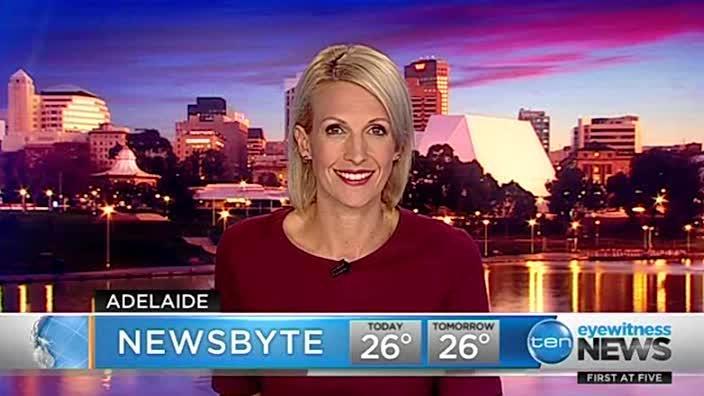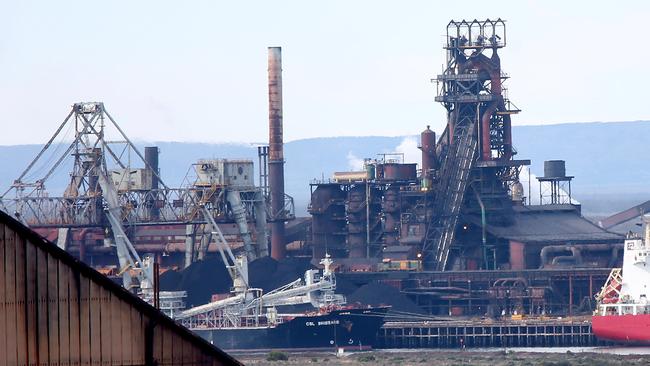New plans to save Australian steel jobs as unemployment figures remain bad
LABOR and Nick Xenophon have unveiled new plans intended to save thousands of jobs in the local steel sector, as SA’s latest unemployment figures provide a small sign of optimism.
SA News
Don't miss out on the headlines from SA News. Followed categories will be added to My News.
- TURMOIL: Court orders new administrators for Arrium
- Q & A: What happens next for Arrium and its workers?
- BATTLE FOR WHYALLA: How the town can be saved
- Olympic Dam expansion hope for Whyalla steel
LABOR leader Bill Shorten and Senator Nick Xenophon have both made calls for a new approach to buy Australian steel as new jobs figures show South Australia’s unemployment rate remains the highest in the country.
Industry Minister Christopher has hit back, accusing Mr Shorten of an “embarrassing backflip” on procurement policy.
In March the state’s unemployment rate eased to 7.2 per cent, from an adjusted 7.6 per cent in February, according to ABS figures released this morning.
That matches the trend rate of 7.2 per cent which remained steady in March.
Nearly 63,000 South Australians remain unemployed.
The next highest unemployment rate in the country is in Tasmania, at 6.9 per cent.
Nationally, the unemployment dropped slightly from 5.8 per cent to 5.7 per cent.

At a press conference in Wollongong this morning, Mr Shorten called for Prime Minister Malcolm Turnbull to escalate the issue of Australian steel jobs while he is in China.
“If he doesn’t raise the issue of standing up for Australian steel jobs in China, then Mr Turnbull is betraying hundreds of thousands of people,” Mr Shorten said.
Mr Turnbull landed in China this morning.
The Prime Minister responded yesterday to questions about whether he would raise steel issues on his visit by saying he would be discussing “the full range of issues” with his Chinese counterparts.
Today Mr Shorten unveiled Labor’s six-point steel plan:
ENSURE Australian standards are upheld in Federal Government funded projects and support local producers meet certification standards.
SEEK to maximise the use of locally produced steel in Federal Government-funded projects and put in place regular reporting of usage levels.
HALVE the thresholds for projects required to have Australian Industry Participation Plans from $500 million down to $250 million for private projects, and from $20 million to $10 million for public projects.
DOUBLE funding for the Australian Industry Participation Authority and appoint an AIP Board.
ENSURE Australia’s anti-dumping system has the right powers and penalties in place.
CREATE a national Steel Supplier Advocate.
Mr Shorten said his party would start delivering the plan within 100 days of taking office if it was successful at the election later this year and he rejected suggestions that the plan would create more red tape.
“Steel is a strategically significant industry for Australia. We must not become the only advanced economy in the world to let our steel industry die,” he said.
Industry Minister Christopher Pyne said Mr Shorten was “wildly trying to come up with a new policy idea”.
At a Press Conference last week the Labor leader had rhetorically asked “what is wrong with requiring Australian content in the steel?”
Mr Pyne accused Mr Shorten of “an embarrassing backflip on his plans to mandate steel purchases in Australia, which was to put at risk our vital free trade agreements”.
Senator Xenophon revealed on Wednesday that he would be pushing ahead with his own plan to ensure Australian governments at state and federal level were encouraged to buy local steel.
“That is something I am working on right now to bring in legislation in the Parliament as a matter of urgency so we can have a new form of procurement policy in this country that is all about ensuring that we can have local jobs, that you take in the economic effects of buying local steel,” he said.
Critics have pointed out that Australia’s international trade arrangements mean foreign steel producers can’t be disadvantaged.
However Senator Xenophon believes it’s possible to give local producers a better opportunity, without kicking off international disputes.
“To suggest this would unleash some sort of trade war is absurd,” he said.
Meanwhile, as reported BHP says it will send a delegation to Whyalla to see how it can support local suppliers and believes there will be increasing opportunities as its Olympic Dam mine in South Australia’s far north ramps up.

Steel producer Arrium employs almost 7000 Australians and is currently in voluntary administration.
The banks and the Australian Workers’ Union successfully applied in the Federal Court on Tuesday to have KordaMentha installed as administrators in place of Grant Thornton.
Closure of its facilities in Whyalla could see thousands of direct and indirect job losses in that town alone.


